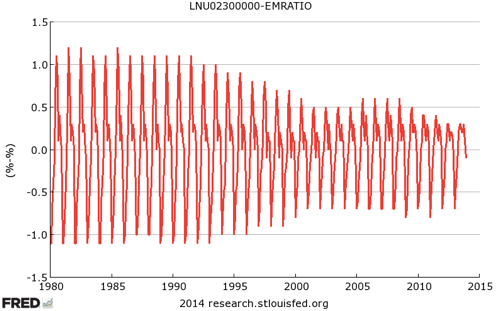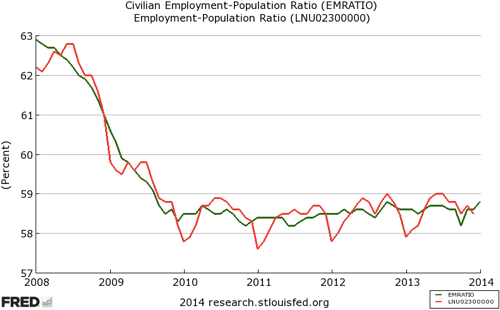The Employment Report: Friday Focus: February 7, 2014
The household-survey seasonally-adjusted employment-to-population ratio jumped a surprisingly large amount in January: from 58.6% to 58.8%. The household-survey not-seasonally-adjusted employment-to-population ratio fell a surprisingly small amount in January: from 58.5% to 58.1%. The seasonal-adjustment factor did its standard recent thing for January: jumped from -0.1%-point to -0.7%-point:
We had this surprising dip in raw employment-to-population in October, when businesses are usually staffing-up for the Christmas rush. Is that connected? That is what I want to know this morning. And I cannot find anybody with both (a) the time and (b) the knowledge to tell me this morning…
Household employment seasonal adjustment factors since 1980 (January 2014 missing–it’s -0.7%-points):

Establishment Report:
Household Report:
Manression:
And, via Anne Laurie, John Cassidy of the New Yorker: That CBO Report: “Six Million Jobs Are Already Missing”: “[S]omething the C.B.O. said that you probably missed, which is based on actual facts rather than on informed speculation:
In the past five years or so—and this has nothing to do with Obamacare—some six million jobs (and workers) have already gone missing from the U.S. economy. That figure was in a separate report that the C.B.O. released on Tuesday, titled, “The Slow Recovery of the Labor Market”… the missing number is six million, which is about the population of Missouri. Based on history, all these people should be earning a living and paying taxes. Instead, they’ve dropped out of the work force, and… well, the truth is, we don’t know exactly what they’ve done. Some of them have probably taken early retirement. Others may be working part time in the black economy. Many of them are almost certainly sitting at home, doing nothing. A few may be glad they’re no longer working, but, from studies of how being jobless affects people, we know that many of them are feeling depressed and worthless. Their inactivity represents a tragic human and economic waste, but, for some reason, it’s not one that the G.O.P. seems particularly indignant about….
Of the roughly three-percentage-point fall in the participation rate since 2007, the [CBO] study attributes 1.5 percentage points to “long term trends (particularly the aging of the population)” and the other 1.5 percentage points to “weak employment prospects” and other “unusual aspects of the slow recovery.”… The Economic Policy Institute found… weak demand accounted for two-thirds of the fall in the participation rate…. Since 2008, the Republicans have been fighting policy efforts to stimulate spending and hiring. In part, they are responsible…
